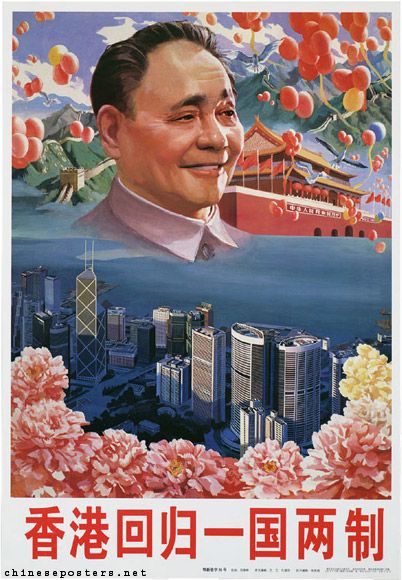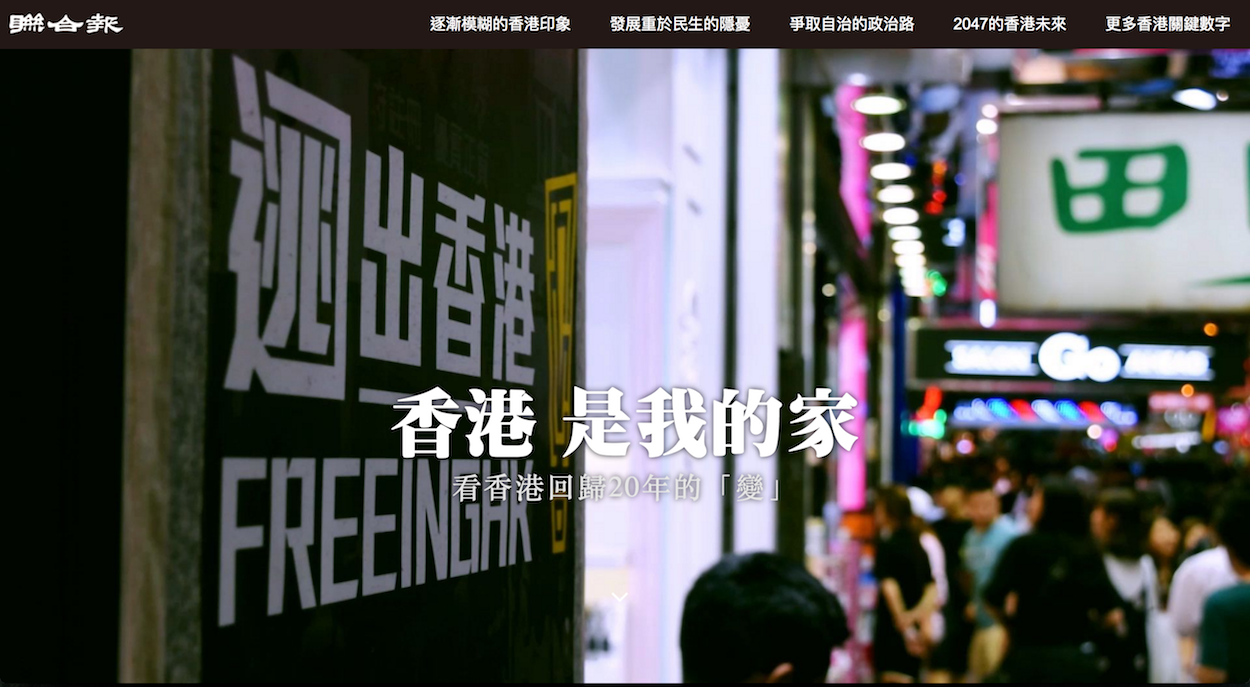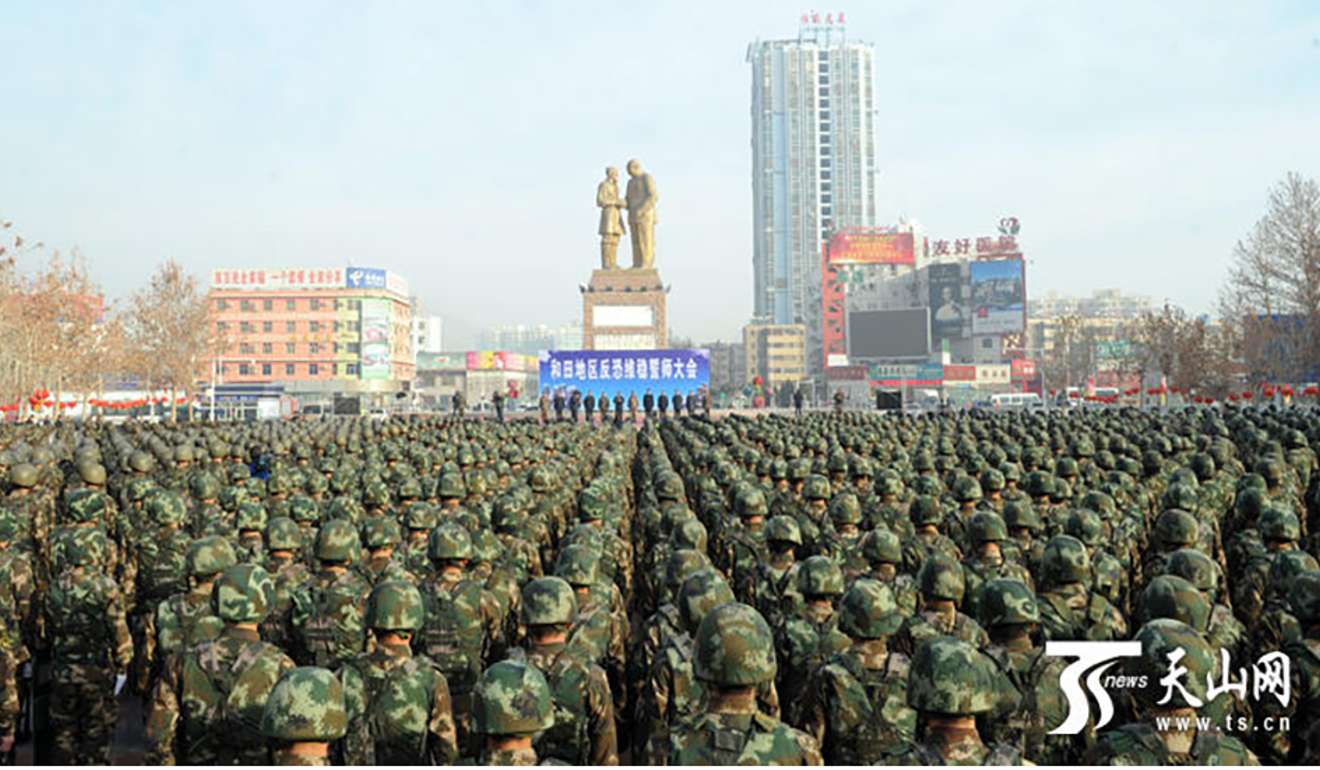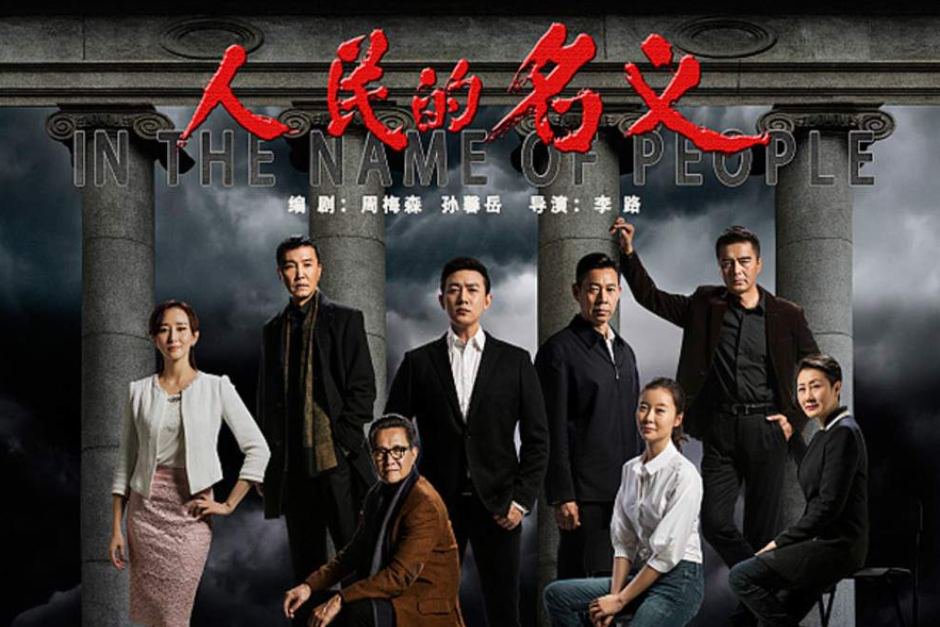by Brian Hioe
語言:
English /// 中文
Photo Credit: Chineseposters.net
PROBABLY IT is best at this point to refer to Coolloud not as a left-wing publication which writes on social movements in Taiwan, but an outright Chinese nationalist publication of the pro-unification Left. This can be seen in the publication of recent article by Tang Kin Ling (鄧健苓), a lecturer in the Department of Linguistics and Modern Language Studies at the Education University of Hong Kong, for which Coolloud has taken much flak in recent days because of its virulently pro-China stance.
Especially provocative has been the fact that, claiming that it needs money in order to continue operating, Coolloud is currently soliciting funds from both readers in China through their WeChat account and in Taiwan through their website. Many readers in Taiwan and elsewhere have taken the view that because Coolloud has a long and important history in new media coverage of social movements in Taiwan, Coolloud should be supported as an independent publication. Yet with Coolloud publishing such overtly pro-China articles, perhaps Coolloud should simply seek funds from the Chinese government? After all, Tang’s article does not read so differently from something that might be published by a Chinese state-run publication and few apart from Coolloud would put out such an article nowadays.
 Photo credit: Chineseposters.net
Photo credit: Chineseposters.net
We might examine Tang’s article, then, as an acute symptom of some of the delusions which the pro-unification Left hold about Hong Kong, Taiwan, and China, in which the overriding logic is fundamentally Chinese nationalism dressed up in the garb of Leftism. Tang’s article concerns itself with the recent 20th anniversary of the handover of Hong Kong from British control to Chinese control. This, for Tang, is to be celebrated in all aspects as the return of Hong Kong from her cartoonishly evil view of western imperialism to the “motherland of socialism” (社會主義祖國), a rose-tinted and highly idealized version of China which only exists in her imagination and the imaginations of other members of the pro-unification Left.
A Willingness By The Pro-Unification Left To Invent History Wholesale
INDEED WHAT proves utterly laughable about Tang’s article is the degree to which it is willing to lie about reality or leave out crucial facts in order to bolster her narrative. This stretches the credibility of the reader to such an extent that one might say that Coolloud has quite little credibility as a publication left after its publication of her piece that one does not really have any faith in Coolloud to report on political events objectively going forward. Yet the willingness of members of the pro-unification to outright lie or to see black where there is white has been readily observed many times in the past. One observes this in, for example, Zhao Gang’s claim some time ago that during the Sunflower Movement, the occupation site was full of “anti-communist slogans” on placards when, in reality, most slogans were about the CSSTA, the Black Box, or the KMT when only the gullible, who had never visited the occupation site, or those who are ideologically inclined to believe such claims, would believe this.
Tang begins by dismissing a report in the United Daily News as fake news concocted by the bourgeois press to stir up panic about the loss of Hong Kong identity with the increased use of Mandarin and retreat of Cantonese use in public spaces. Tang, ostensibly a scholar of linguistic and translation theory according to her CV, first resorts to spurious claims to undermine the report’s veracity by claiming that United Daily News’ have no way to verify the retreat of Cantonese in public spaces and are simply asserting this without backing, claiming it is a given that for individuals of different provinces to be able to communicate with each other using the common language of Mandarin and so this does not mean that Cantonese is on the retreat in China, in the way that other dialects in China do not seem to be threatened by the common usage of Mandarin. Instead, Tang claims that while Mandarin usage has increased in Hong Kong, this does not mean that Cantonese is on the retreat either, but that the two languages now coexist in Hong Kong. Yet while Tang claims that the United Daily News is on the level of a “middle school student” in its reporting of unconfirmed falsehoods, neither does Tang back her claim up with any statistics or interview whatsoever, simply asserting claims which bolster her narrative by fiat.
 Photo credit: UDN
Photo credit: UDN
Then, Tang attempts to dismiss concerns about the loss of Hong Kong identity altogether by claiming that concerns about the retreat of democracy in Hong Kong are wholly concocted. Tang argues that this is simply the propaganda of the bourgeois press and responds by coming up with a fanciful narrative of her own, claiming that Hong Kong existed in an apartheid state under the British in which the average person was shut out of society entirely because the British lorded over the city as its elite ruling class, the British used English, and so the institutions of society in catering only to the British elite shut out the majority of society, who could not speak English.
And so Hong Kong is now democratic than it ever was during British rule, according to Tang. Certainly, it is true that despite rising nostalgia for the British colonial period since Hong Kong reverted to Chinese control also sometimes sees this history in a rose-tinted light, seeing as Hong Kong did not have universal suffrage under the British, and neither does it now under the Chinese, democratic measures having only been introduced into Hong Kong as the British were in the process of withdrawing from Hong Kong and turning it over to the Chinese, something which took place during Chris Patten’s tenure as Hong Kong’s last colonial governor. But no mention is made anywhere in Tang’s narrative of the kidnapping of Hong Kong booksellers who published books critical of the Chinese Communist Party, the increasing use of violence against peaceful protesters by pro-Beijing mobs, and invalidation of election results for Hong Kong legislators voted into power by over 180,000 people simply because Beijing does not acquiesce to their taking power. Whatever the growing influence that China has over the writing and teaching of history in Hong Kong, such as in high school history textbook textbooks, thankfully we are not at the point that Tang and other pro-China actors can simply concoct an entirely false narrative of Hong Kong’s history—hardly ancient history, but history within living memory, no less—and this will simply be accepted because the historical truth has been wiped out and replaced entirely by propaganda, a la 1984.
Attempts To Dismiss The Umbrella Movement As Bourgeois, Colonial, And Infected By A Western Mentality And To Depict China In The Rosiest Of Terms
TANG NEXT goes on to adopt the usual pro-unification Left strategy of dismissing the Umbrella Movement and any other political actors that resist China as infected by a bourgeois, colonial, and western mentality. Certainly, a capitalist democracy is not true democracy, seeing as under capitalism, what goes by the name of democracy is still at the end of the day rule by the bourgeoisie and 1%. Again, any Hong Kong democracy is fairly recent, and Hong Kong’s democratic system is highly dominated by powerful corporations given that corporate interests are allowed to have a direct vote in legislature through the system of “functional constituencies.” But, at the very least, before Hong Kong reverted to Chinese control, suppressions on the basic freedoms of speech and assembly of Hong Kongers were not that candidates for political office would have to be first vetted by the state and might still have their election victories annulled after winning office, nor did the state kidnap those critical of it at will, with the possibility that they will be murdered the way China more or less recently killed Liu Xiaobo—in which Liu’s family was not even allowed to mourn Liu before the state decided that his body had to be burnt into ash, eradicated from the very earth, in order to make sure that no trace of the man existed in life or death.
And so the concern of Hong Kongers over the loss of their democracy to China is simply dismissed as an elitist attitude against mainland Chinese inculcated into them by British colonialism, such as elitist disdain for mainland Chinese who may not have western manners, such as in high-profile incidents of mainland Chinese defecating on public streets and the like, as well as a deeply rooted ethos of anti-Communism. Those who lead movements against Chinese rule are dismissed as compradors longing to past colonial privileges and to restore Hong Kong to its past image of global cosmopolitanism, given the city’s centrality as an international financial and economic center. Tang attempts to demonstrate the elite nature of social movement leaders by…pointing to the Admiralty encampment of the Umbrella Movement and noting how occupiers used a fancy public restroom which simply happened to be nearby to claim that they were all elite, transnational wealthy compradors, that is to say, members of the bourgeoisie.
 Photo credit: TNews
Photo credit: TNews
Indeed, ethno-nationalism in Hong Kong and disdain for mainland Chinese is a problem, and there is certainly a class element as to why residents of Hong Kong might disdain their mainland counterparts for lacking western manners by virtue of where they happened to be born. But at the same time, this is no evidence of the elite nature of Hong Kongers nor any reason why residents of Hong Kong should not be concerned about the loss of their democratic freedoms. And if one wants to talk about ethno-nationalism, as the proverb goes, “Why do you look at the speck of sawdust in your brother’s eye and pay no attention to the plank in your own eye?” China recently confiscated the passports of all residents of the Uighur majority Xinjiang region, ordered the installation of GPS trackers in all cars in the Uighur-majority Bayingolin Mongol Autonomous Prefecture in northwest Xinjiang, and stages massive military rallies in order to cow the population into fear—and, given the numerous photos taken by state-run media or the official press released which Chinese state-run media is happy to circulate, it is not as though this can be dismissed as simply western propaganda.
Tang rightly notes that Hong Kong is one of the most economically unequal places in the world and that Hong Kong society is plagued by corporate interests, but this is not cause to dismiss a mass movement of the people from Hong Kong as simply elitist. As with many members of the pro-unification Left, Tang is dismissive of anything from Hong Kong because she sees Hong Kong only in terms of an international economic and financial center which she perceives as still better off than China, never mind that Hong Kong has a working class of its own and many of these individuals participated in the Umbrella Movement because of the negative impact the Chinese government has had on them economically and politically.
On the contrary, Tang’s so-called “motherland of socialism” is also one of the world’s most economically unequal societies. Why? Because of the leadership of CCP elites who are the real transnational bourgeoisie which Tang claims that the leadership of the Umbrella Movement is, who operate in Hong Kong through their comprador intermediaries of the Hong Kong central government and Hong Kong’s business tycoons who do business between China and Hong Kong. As such, it is no surprise that they work together to oppose the working class of China and Hong Kong alike due to their shared class interest, something which rises above national divisions. For example, in examining the children of Chinese president Xi Jinping, outgoing Hong Kong Chief Executive CY Leung, and incoming Chief Executive Carrie Lam, one observes that their children have universally studied abroad in western countries at odds with China such as America and the UK, and evidence extreme wealth in their behavior, particularly in the case of CY Leung’s daughter, who are frequently in the spotlight due to causing public controversy by flaunting their elite privilege. The union of such working classes should be what leftists argue for, not statist, nationalistic apologism for authoritarian China.
 Photo credit: In The Name Of The People
Photo credit: In The Name Of The People
In this sense, it actually is that the CCP is the shared enemy of the working classes of China and Hong Kong alike. But, reflecting the fundamentally nationalist and fundamentally statist worldview of many members of the pro-unification Left, Tang cannot see this, instead idealizing China in the highest terms and acting as an apologist for the CCP, the greatest enemy of China’s working class. All other nations out there must subordinate themselves to China by virtue of only China being the bastion of the working, or even having any working class, in fact. Tang only makes one concession in the direction of acknowledging that the CCP’s rule is, in fact, capitalist rule by suggesting that China has only in some respects joined world capitalism (中国在某程度上加入了世界资本主义的运作) and citing the popularity of the state-produced TV drama In The Name Of The People to suggest the preservation of socialist ideals in China.
But, as Nietzsche once said, “A state, is called the coldest of all cold monsters. Coldly lieth it also; and this lie creepeth from its mouth: ‘I, the state, am the people.’” In The Name Of The People, in fact, proves a perfect example of the falsity of China’s claim to be a socialist or communist nation as a high budget state-run propaganda effort through which the state claims to act in the name of the people, but the constant focus on corruption-busting of state actors by other state actors within the television series serves as the state attempting to provide an excuse as to why corruption is so widespread within government institutions by claiming that this is a problem it is “working on.” As some of the main characters of In The Name Of The People, distinguished from other corruptible state actors by their apparently “noble” incorruptibility, are in fact suggested to descend from families with powerful political lineages within the CCP, this points to nepotism within the graft within the CCP, but how the rule of a few powerful families is justified by elevating these individuals to divine, revolutionary incorruptibility because of their descent as “princelings” from Mao era revolutionaries—something true of Xi Jinping himself as the son of Xi Zhongxun, one of the first generation of CCP leadership. As Chinese scholars themselves have pointed out, in a telling omission, what is wholly missing from In The Name Of The People is in fact precisely that: ordinary people and the everyday working class.
The Political Bankruptcy of the Pro-Unification Left
WHAT WE should ultimately take away from Tang’s essay and its publication Coolloud, then, is the political bankruptcy of the pro-unification Left. They are not leftists of an internationalist stripe in the least, but merely Chinese nationalists all too willing to see black where white is in order to defend their Chinese nationalism, as we see with Tang’s argumentation regarding Hong Kong and as we also see with argumentation by pro-unification Leftists elsewhere regarding Taiwan. And one also observes a great deal of degradation in the argumentation of the pro-unification Left as time has gone by. What wool do they think they are pulling over whose eyes at this point? No longer are their arguments even logical, but simply so many falsehoods woven together in order to create a fictive version of reality. For all their criticisms of western imperialism in universal and monolithic terms, never mind that the West, too, has a working class, one actually suspects that only naive western leftists who know very little about Hong Kong, China, Taiwan, or Asia will believe their claims—as is sometimes the case, particularly in outreach attempts to western academic leftists by members of the pro-unification Left or Chinese New Left.
A sad fate and one we should perhaps be more pitiful of than anything else, really, for the pro-unification Left. However well-intentioned they may be in being willing to take a minority view for something they believe to be the working class but is actually the Chinese state, at best, their fate may one day be for the actual international working class to sweep them away along with the CCP, with the view that they are allies of and apologists for the CCP. A sad fate, but one which they would have brought upon themselves.

